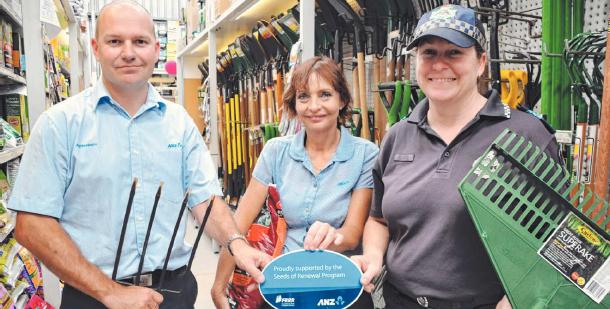Community stories: 20 November 2018
Four years ago, the Bowen branch of the PCYC received an $8,000 ANZ Seeds of Renewal grant towards equipment for its Greener Futures program. More recently the town of Bowen was hit by Cyclone Debbie.
A year on from that, FRRR’s team were in Bowen running a workshop for grant-seekers and explaining what support would be available to the community to help with the ongoing recovery.

Local PCYC Branch Manager, Sergeant Michelle O’Regan made a point of coming along to the session to thank FRRR for the support the PCYC had received for the Greener Futures program.
Seed funding
PCYC Queensland’s Greener Futures program aimed to support ten students from Bowen State High School to gain hands-on experience in the horticulture industry and ultimately make them more employable.
“We take a proactive approach by giving young people leadership and building their employability skills. We tap into local resources and connect schools with businesses to build that sense of community. They say it takes a village to raise a child, so our customer is the whole community – it’s about working together and opening up opportunities for both sides to connect,” said Sergeant O’Regan.
She went on to say that seed funding was really important.
“Without that initial funding, we would have never have got the program off the ground. While the program has evolved over time, looking back [the grant] was pivotal to where we are now,” Sergeant O’Regan said.
She explained that the long-term plan for Greener Futures was two-pronged; to expand quality employment opportunities in local industries for young people facing barriers in the labour market, and to strengthen the economic vitality of the local sector through strategic support and consumer education.
Sergeant O’Regan said the initial funds were a catalyst for attracting further support and gave credibility to the initiative and what they were trying to achieve.
“The initial pilot program was a successful partnership between the high school, Stackelroth Farms, and Prospect Agriculture, with in-kind support from other local businesses and organisations that ensured the program’s success.
“That program morphed into the Resilience for life (R4L) program, which focussed on more the psychological wellbeing of our youth and attracted funds from Perpetual. From there R4L eventually became our now hugely successful WORKFit program. We received $20,000 in funds from the Queensland Government, which enabled us to employ a community development officer.
“But without the initial injection of funding from ANZ and support from FRRR, we would have struggled to get the pilot program up and running and, therefore, we would not have ended up with the program we are delivering now.
“All I know, when you build a house you need first the foundation. Five or six years later, we look back and see that those small grant funds were really pivotal to where we are now. We could never have pre-planned that.”
And she says that the benefits aren’t what you may expect.
“There are multiple layers – from small things big things can grow. For example, if we don’t have a working kitchen, we can’t hold community events or run mental health awareness programs. A bus, even, can really make a big difference to a small community.”
The role of Philanthropy
Sergeant O’Regan believes that communities need to help themselves rather than being entirely reliant on money. But it certainly helps.
“The role of philanthropy is about giving that a bit of a boost. That confidence that what they are working towards is going to be beneficial.
“It should be a hand-up, not a hand-out. Some communities are reliant on money coming in from outside, rather than working together. If you want something, you have got to work towards it. Whether it is a raffle or something else. Our young people have put in around 5,000 hours – they really want to be part of what we do.”
Sergeant O’Regan explains that people want to help, but they don’t always know how. Corporates may not have the time or the connection within the community to initiate support, but by spending time with a group, they can often work out where they can help best.
“It’s not always about money. Support can be in time and expertise. For example, I would love to be able to connect with a good business mentor, who would give up a bit of their time, so I can share my vision and ideas.
“It is about working in partnership. Come and have a look, philanthropists – see for yourselves. Let’s work together.”

